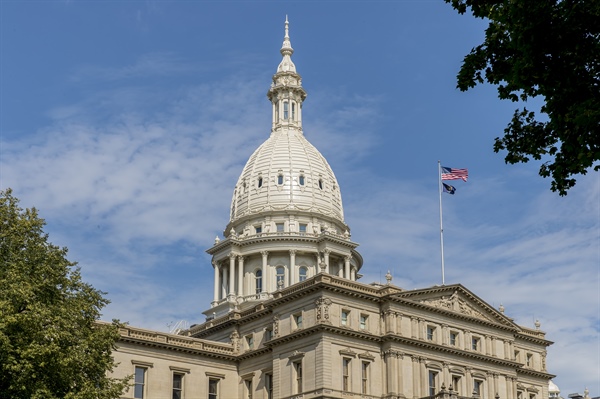
Article courtesy MIRS News Service
Michigan can collect the 6 percent sales taxes from online stores that don’t have a physical presence in Michigan — thanks to a U.S. Supreme Court decision Thursday.
In a 5-4 ruling, Justice Anthony Kennedy, who wrote the majority’s opinion, said the rule established in Quill Corp. v. North Dakota that a business must have a physical presence in a state to collect and remit sales tax “is unsound and incorrect,” and the court overturned that 1992 case in its ruling Thursday in South Dakota v. Wayfair Inc.
“From a retailers association’s perspective, we are very happy about this ruling,” Meegan Holland, vice president of communications at the Michigan Retailers Association, said. “In fact, retailers have been waiting for a couple decades. It brings commerce into the 21st century . . . and levels the playing field.”
Department of Treasury spokesman Ron Leix called it an “important step forward in the fair administration of our tax system.” He said the Treasury Department will review the decision and assess its impact on Michigan in the coming days.
Not everyone, however, is pleased with the decision.
Tom Giovanetti, president of the Dallas, Texas-based nonprofit Institute for Policy Innovation, said the decision leaves e-commerce, especially small sellers, “extremely vulnerable to states gluttonous for tax revenue, particularly from consumers and businesses with no representation in their state.”
“If that sounds to you like taxation without representation, you’re right,” he said in a prepared statement. “Thankfully, the court did recognize the vulnerability of small business to such state gluttony. It falls to Congress now to reinforce this recognition by crafting legislation with a significant small business exemption, a substantial, defensible nexus standard, and a safe harbor for small sellers complying in good faith with the requirements of the law.”
Chief Justice John Roberts, who wrote the dissenting opinion, agreed noting that e-commerce has grown “into a significant and vibrant part of our national economy” within currently established rules and “any alteration to those rules with the potential to disrupt the development of such a critical segment of the economy should be undertaken by Congress.”
“The Court should not act on this important question of current economic policy, solely to expiate a mistake it made over 50 years ago,” Roberts wrote, referencing National Bellas Hess Inc. v. Department of Revenue of Illinois, in which the court held states couldn’t collect sales taxes from retailers without a physical presence in the state.
“A good reason to leave these matters to Congress is that legislators may more directly consider the competing interests at stake,” Roberts noted.
Justices Stephen Breyer, Sonia Sotomayor and Elena Kagen joined Roberts.
It is not known when Michigan will begin charging online retailers without a presence in the state.
The state currently collects sales tax from some in-state online companies under Michigan’s Main Street Fairness Act (MSFA), which Gov. Rick Snyder signed into law in January 2015. The act was designed to boost Michigan’s economy and help local businesses by requiring shoppers pay sales tax when purchasing items online from websites with a physical presence in the state, such as Amazon.
The May 2017 Consensus Revenue Estimated Conference estimated sales tax revenues from the MSFA at $74 million for Fiscal Year (FY) 2018 and at $78 million for FY 2019, according to figures provided by the state Treasury department.
It is estimated Michigan’s revenue loss due to consumer e-commerce would increase from $269 million in fiscal year 2014 to $300 million in FY 2017, which runs Oct. 1, 2016, to Sept. 30, 2017, according to Michigan’s Sales and Use Taxes 2014 report.
South Dakota Sen. Deb Peters, president of the National Conference on State Legislatures and author of South Dakota’s remote sales tax legislation, called the court’s decision “a victory for Main Street America.”
“Brick and mortar stores will no longer be penalized for collecting the tax revenues that fund our schools, infrastructure, and the vital public services that state and local governments provide,” she said in a prepared statement. “For states, today is just the beginning.
“We’ve waited 26 years. Good tax administration is good public policy and state officials look forward to working with all stakeholders in the coming months as we move forward to level the playing field for all of our nation’s retailers,” Peters added.